

Reading Comprehension. Within this page,the complex processes involved in reading comprehension are divided into three categories (much like the National Reading Panel Report).
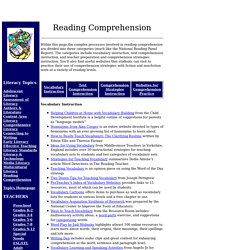
The categories include vocabulary instruction, text comprehension instruction, and teacher preparation and comprehension strategies instruction. You'll also find useful websites that students can visit to practice their use of comprehension strategies with fiction and non-fiction texts at a variety of reading levels. Vocabulary Instruction Helping Children at Home with Vocabulary Building from the Child Development Institute is a helpful outline of suggestions for parents as "language models" Homonyms from Alan Cooper is an entire website devoted to types of homonyms with an ever growing list of homonyms to learn about. Text Comprehension Instruction Teacher Preparation and Comprehension Strategies Instruction Websites for Comprehension Practice.
Reading Rockets. Six Scaffolding Strategies to Use with Your Students. What’s the opposite of scaffolding a lesson? Saying to students, “Read this nine-page science article, write a detailed essay on the topic it explores, and turn it in by Wednesday.” Yikes! No safety net, no parachute—they’re just left to their own devices. Let’s start by agreeing that scaffolding a lesson and differentiating instruction are two different things. Scaffolding is breaking up the learning into chunks and providing a tool, or structure, with each chunk. Simply put, scaffolding is what you do first with kids.
Scaffolding and differentiation do have something in common, though. So let’s get to some scaffolding strategies you may or may not have tried yet. 1. How many of us say that we learn best by seeing something rather than hearing about it? Try a fishbowl activity, where a small group in the center is circled by the rest of the class; the group in the middle, or fishbowl, engages in an activity, modeling how it’s done for the larger group. 2. 3. 4. 5. 6. Projects to Engage Middle School Readers. It's my fault.
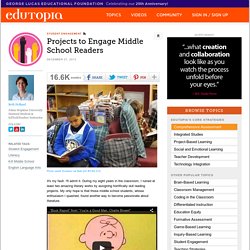
I'll admit it. During my eight years in the classroom, I ruined at least two amazing literary works by assigning horrifically dull reading projects. My only hope is that those middle school students, whose enthusiasm I quashed, found another way to become passionate about literature. Peanuts raises some interesting questions about the value of reading projects. Does Lucy clearly articulate her understanding of Peter Rabbit? In middle school, we ask students to dissect texts and perform literary analysis. Nurturing Literacy: Tips and Resources For Developing Lifelong Readers. The importance of early literacy cannot be understated.
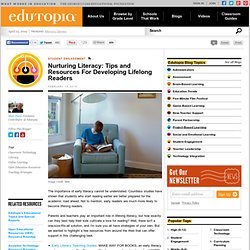
Countless studies have shown that students who start reading earlier are better prepared for the academic road ahead. Not to mention, early readers are much more likely to become lifelong readers. Parents and teachers play an important role in lifelong literacy, but how exactly can they best help their kids cultivate a love for reading? Well, there isn't a one-size-fits-all solution, and I'm sure you all have strategies of your own. But we wanted to highlight a few resources from around the Web that can offer support in this challenging task. 12 Ways to Motivate Reluctant Readers. I think I must have been born with a book in my hand!
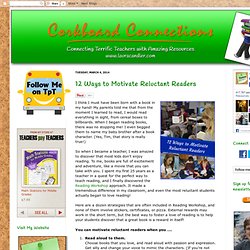
My parents told me that from the moment I learned to read, I would read everything in sight, from cereal boxes to billboards. When I began reading books, there was no stopping me! The Importance of Phonics Instruction for Beginning and Struggling Readers. For Beginning and Struggling Readers According to researchers, if three areas of reading were appropriately addressed, reading difficulties would be prevented.
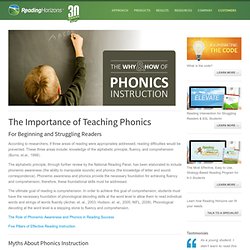
These three areas include: knowledge of the alphabetic principle, fluency, and comprehension (Burns, et.al., 1998). The alphabetic principle, through further review by the National Reading Panel, has been elaborated to include phonemic awareness (the ability to manipulate sounds) and phonics (the knowledge of letter and sound correspondence). Phonemic awareness and phonics provide the necessary foundation for achieving fluency and comprehension; therefore, these foundational skills must be addressed. Strategies for Activating Prior Knowledge. Free Teaching Resources - Graphic Organizers.